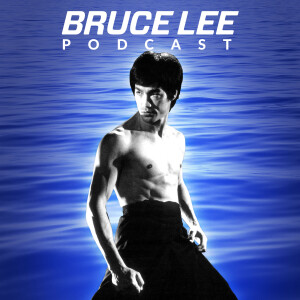
Truth was an important concept to Bruce Lee and it shows up often in his journal entries. But the way he used the word “truth” was not to describe a fact or to be the opposite of a lie. He wrote about a deeper, more of a philosophical, spiritual definition of truth—a concept close to the Tao. It’s why we’re calling it The Real Truth. “The word Tao has no exact equivalent in the English language, to render it into way, principle, or law, is to give it too narrow of an interpretation. Although no one word can substitute for its meaning, I have used the word truth for it.” Bruce understood Truth to be the Tao or the way of the universe. Truth is nowhere and everywhere at the same time, and there a little bits of Truth in all things. This is the way of nature. “Truth is a pathless road, a road that is not a road. It is total expression that has no before or after. How can there be methods and systems by which to arrive at something that is living? To that which is static, fixed, dead, there can be a way, a definite path but not to that which is living.” The Real Truth is something that’s alive, something that we are in relationship with, and happening in the present moment. “Truth comes when your mind and heart are purged of all sense of striving and you are no longer trying to become somebody. It is there when the mind is very quiet, listening timelessly to everything.” “I’ve said before truth is nowhere to be found on a map, your truth is different than that of mine. At first you might think that this is truth, but later you discover another truth and the former truth is denied, but you are, in fact, closer to truth. Perhaps when we have found more about what is not the truth we will be that much closer to the truth.” A core tenet of Bruce Lee’s philosophy is independent inquiry. “We shall find the truth when we examine the problem. The problem is never apart from the answer; the problem is the answer.” If you are moved to this path of Truth, you will come up against established ways and you’ll have to confront your own biases. It’s ok to hold on to your truths, but you should check in regularly with yourself to see if they remain true. “I’m a changing as well as ever-growing man.” Take Action: Are you a seeker? Do you want to be a seeker? Acknowledge that you’re a seeker and on this path to truth and freedom. Tackle one judgment or cultural context that you were raised in and be in inquiry with it. Are you happy in your everyday life? What shifts can you make to amplify your joy? #AAHA This week our #AAHA is Japanese artist and writer Yayoi Kusama. She has worked in a wide variety of media: painting, sculpture, collage, performance art, and environmental installations. She was a part of the pop art movement and influenced Andy Warhol, and exhibited alongside them but did not receive very much recognition during the 1960s. Kusama is now recognized as one of the most important living artists to come out of Japan. In 2008, Christies’s New York sold a work for her for $5.1 million, then a record for a living female artist. Major retrospectives of her work have been held at the MOMA, the Whitney Museum, the Tate Modern, and the Hirshhorn Museum. Her Infinity Room exhibit is currently on display at the Broad in Los Angeles. Yayoi Kusama, you are so awesome! #BruceLeeMoment This week’s moment comes from listener Bruce P.: “I just wanted to say thank you for the great podcasts. I am a hospice chaplain and I obviously deal with grief all day long on a daily basis. Shannon's frequent laughter as she discusses Bruce's philosophy and daily life certainly helps me break out of the oppressive spiraling memory of what I have just witnessed at the bedside of a patient. Thank you for the refreshing dialogue and thought provoking discussions presented in such an entertaining way.” Share your #AAHAs, #BruceLeeMoments, and #TakeAction progress with us at hello@brucelee.com Find the full version of our show notes at BruceLee.com/podcast
view more
More Episodes
#405 Flowing with the Chan Clan
 2021-11-25
2021-11-25
 2021-11-25
2021-11-25
#404 Flowing with Dean Jagger
 2021-11-18
2021-11-18
 2021-11-18
2021-11-18
#403 Flowing with Steven Ho
 2021-11-11
2021-11-11
 2021-11-11
2021-11-11
#402 Flowing with Dustin Nguyen
 2021-11-04
2021-11-04
 2021-11-04
2021-11-04
#401 Flowing with Jon Boogz
 2021-10-28
2021-10-28
 2021-10-28
2021-10-28
#305 Flowing with Michelle Manu
 2021-06-03
2021-06-03
 2021-06-03
2021-06-03
#304 Flowing with Jason Tobin
 2021-05-28
2021-05-28
 2021-05-28
2021-05-28
#303 Flowing with Diana Lee Inosanto
 2021-05-20
2021-05-20
 2021-05-20
2021-05-20
#302 Flowing with Jeff Chang
 2021-05-13
2021-05-13
 2021-05-13
2021-05-13
#301 Flowing with Justin Lin
 2021-05-06
2021-05-06
 2021-05-06
2021-05-06
New Season Teaser
 2021-04-29
2021-04-29
 2021-04-29
2021-04-29
#216 Flowing with the Simple Truth
 2021-02-11
2021-02-11
 2021-02-11
2021-02-11
#215 Flowing with Mozez
 2021-02-04
2021-02-04
 2021-02-04
2021-02-04
#214 Flowing with Cal Fussman
 2021-01-28
2021-01-28
 2021-01-28
2021-01-28
#213 Flowing with Kerri Walsh Jennings
 2021-01-21
2021-01-21
 2021-01-21
2021-01-21
#212 Flowing with Ben Bruno
 2021-01-14
2021-01-14
 2021-01-14
2021-01-14
#211 Flowing with Tony LeRoy
 2020-12-24
2020-12-24
 2020-12-24
2020-12-24
012345678910111213141516171819
Create your
podcast in
minutes
- Full-featured podcast site
- Unlimited storage and bandwidth
- Comprehensive podcast stats
- Distribute to Apple Podcasts, Spotify, and more
- Make money with your podcast
It is Free
- Privacy Policy
- Cookie Policy
- Terms of Use
- Consent Preferences
- Copyright © 2015-2024 Podbean.com




